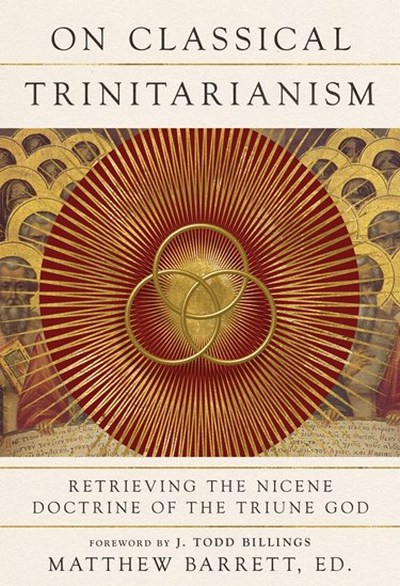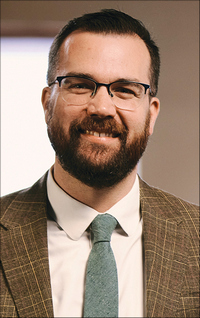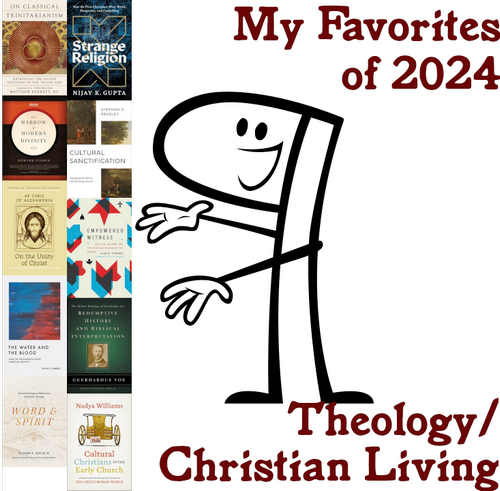
It’s time for me to start with these lists, I guess. We’re going to start with my favorites in Theology and Christian Living (and related things). There’s some overlap in some of these titles, which just shows what kinds of things I was thinking about this year, I guess. I didn’t read as many books along these lines as I expected to/usually do–mostly because the ones I did read took some work to get through (and I had too many “project reads”). But these would’ve floated to the top in any year.
As always, re-reads don’t count for these lists.
(in alphabetical order by author)
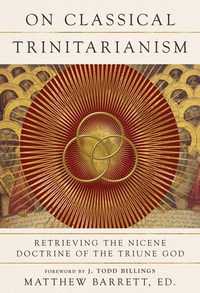 On Classical Trinitarianism: Retrieving the Nicene Doctrine of the Triune God
On Classical Trinitarianism: Retrieving the Nicene Doctrine of the Triune God
edited by Matthew Barrett
My original post
This is simply a monumental work that the Western Church desperately needs. (at least from where I’m sitting) Barrett and the all-star group of contributors make the case that we need to remember, if not rediscover, the classical, Nicene doctrine of the Trinity (as well as that which led to it and from it). We ignore it at our own peril and play fast-and-loose with it today to the damage of our preaching, our sanctification (collectively and individually), and our mission. These 800 pages of articles define the essentials, expand upon those definitions, show where we’re falling and failing and point us to recover lost ground.
I read it far, far too quickly to get everything it was trying to do–I’m going to take another run at it soon and will read it slowly, with a notebook in hand.


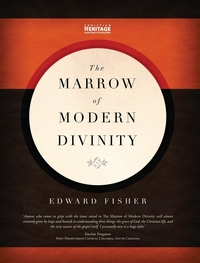 The Marrow of Modern Divinity
The Marrow of Modern Divinity
by Edward Fisher, Thomas Boston
My original post
This is one of the most famous (or infamous) books in the Scottish Reformed tradition–Edward Fisher’s defense of the Gospel against the errors of legalism and antinomianism with (generally) helpful notes (as short as a phrase or as long as several paragraphs) by Thomas Boston that created a controversy in the Church of Scotland big enough that books are still being written about it.
The Marrow is so clear. It’s so helpful. It’s so full of Gospel truth and assurance. It’s so spot-on in describing the ditches of legalism and antinomianism that are so easy to fall into. And yet, it never gets nasty or harsh in the criticism of the errors, it just points at them and says, “Don’t go there, and here’s why.” So few books along these lines manage that (I’m not saying they’re wrong to show teeth, but Fisher/Boston show you don’t need to).
I cannot recommend this enough.

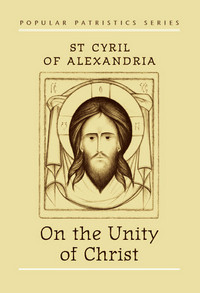 On the Unity of Christ
On the Unity of Christ
by Cyril of Alexandria, John Anthony McGuckin (Translator)
My original post
One thing that goes along with our problems with Trinitarian Theology is Christology–particularly the Unity of the Divine and Human natures of Jesus Christ. It’s not an easy thing to grapple with, make no mistake, but it’s not something we should take casually, either. Cyril of Alexandria’s On the Unity of Christ is one of the landmark works in the development/defense of this idea–and reading it you understand why it’s stood the test of time. The translation (and, I assume, Cyril’s original) flows easily, most of it can be understood by 21st Century readers (even those of us relatively unschooled in philosophy or technical theology). The case he’s making is easy to follow and profit from.
Sometimes it’s hard to understand why something is considered a classic outside of its age. On the Union of Christ is not one of those books.

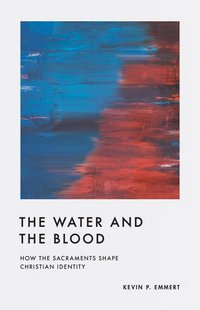 The Water and the Blood: How the Sacraments Shape Christian Identity
The Water and the Blood: How the Sacraments Shape Christian Identity
by Kevin P. Emmert
My original post
I read this last January, and should probably schedule a re-read soon. It’s one of those books.
It’s is a confessional (from all over the Protestant spectrum) and theological look at the sacraments and their role in teaching Christians about Christ and forming their character and lives in Him. The book starts by talking about the dependence of the Sacraments on the Word, then moves to a look at the nature of the Sacraments and how they function generally to form Christians. The next two chapters look at each Sacrament specifically—what they tell us about those “who have been immersed into Christ and who commune with Him.” The last two chapters apply all this, how the Sacraments form and inform Christian morality and then how they equip and guide believers into the work of ministry in a variety of settings.
The focus of the book is our identity in Christ—the doctrine of Union with Christ—and how the sacraments shape us into better living out that identity. And I just wanted to marinate in that for days. I still do, really.

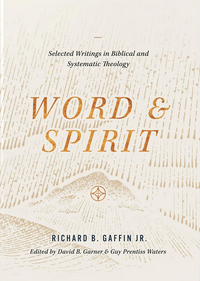 Word and Spirit: Selected Writings in Biblical and Systematic Theology
Word and Spirit: Selected Writings in Biblical and Systematic Theology
by Richard B. Gaffin, Jr.; edited by David B. Garner & Guy Prentiss Waters
My original post
This is a collection of most (if not all) of the shorter works of Richard Gaffin organized under the topics of: Hermeneutics, Biblical Theology, and Systematic Theology; Theology of Hebrews and Paul; Scripture, Epistemology, and Anthropology; Pneumatology; and The Law of God, Soteriology, and Eschatology.
If I were asked what was the best section, or the best piece in the book (or in each section), I’d balk. If pressed, I’d make an attempt and would end up arguing for just about every piece in the book. It’s probably the book on this list I profited the most from. I expect that to be true–or at least in the running–anytime I pick it up in the future.

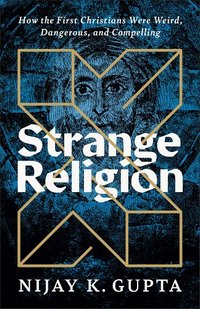 Strange Religion: How the First Christians Were Weird, Dangerous, and Compelling
Strange Religion: How the First Christians Were Weird, Dangerous, and Compelling
My original post
Gupta’s aim is to show how strange the early Christians appeared to their neighbors due to their practices, beliefs, and attitudes. Not as a call to “keep Christinity weird” or anything–but to remind us how odd we are compared to everyone around us, and we’ve always been that way.
There’s the implication that if we don’t seem weird to those outside the Church, maybe we’re doing something wrong. But that’s not his main point.
Also, the strange-ness of early Christianity was one of the things that attracted some to the Church. It was different, it was distinct, and that drew in people who saw the shortcomings of their culture.
It’s a somewhat humorous (but not jokey) and engaging read that educates and challenges. It’s well worth your time.
This could/should be read in conjunction with the books by Williams and Presley on this list, they describe some of the same time period in overlapping but distinct ways.

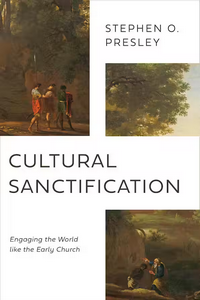 Cultural Sanctification: Engaging the World Like the Early Church
Cultural Sanctification: Engaging the World Like the Early Church
My original post
While many look at the increasinly post-Christian world we seem to be living in and come up with plans for waging a Culture War of one form or another, Presley asks why not look to the Early Church, the pre-Constantinian believers who were in a situation very similar, but a pre-Christendom. How did they go about interacting with the culture? This book explores that idea by looking at the way Christians believed, taught, and acted (generally speaking, recognizing outliers and sins along the way) in the spheres of: Identity, Citizenship, Intellectual Life, Public Life, and Hope.
His position is, to over-simplify: through a focus on catechesis (or, if you prefer, discipleship) and liturgy (or, if you prefer, worship) the Church was able to build identity and community, able to live out the lives they were called to and to impact—slowly and organically—the culture around them.
It’s not a perfect book, but it’s so helpful that it’s easy to overlook what few problems/quibbles I might have had with the writing/examples. It’s a reminder that the Church ought to be the Church (see the book by Strange below), and focus on that.
This could/should be read in conjunction with the books by Williams and Gupta on this list, they describe some of the same time period in overlapping but distinct ways.
Oh, yeah, it hasone of the best indexes I encountered last year, too.

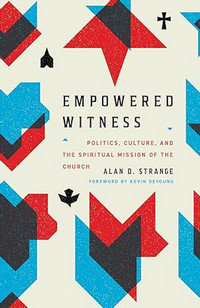 Empowered Witness: Politics, Culture, and the Spiritual Mission of the Church
Empowered Witness: Politics, Culture, and the Spiritual Mission of the Church
by Alan D. Strange
My original post
This is an introduction to and defense of the Presbyterian doctrine of the Spirituality of the Church (essentially that the Church has a ministerial, not majesterial/legislative, calling). The book accomplishes its task primarily
by looking at the way Charles Hodge and some of this Southern Presbyterian opponents–who all held to this doctrine–dealt with the issue of slavery/The Civil War in the middle of the 19th Century.
It might seem like a strange approach, but it really works–keeping it from contemporary arguments, Strange is able to talk about these things without bringing in too many prejudices or getting distracted by trying to comment on contemporary issues.
There are few books (of any genre) that I’ve spent as much time talking about over the last year as I have this one. It’ll spark conversation for you, if nothing else. But you’ll profit from it greatly.

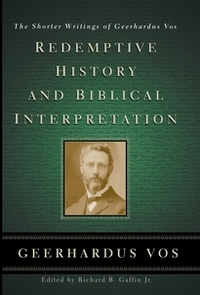 Redemptive History & Biblical Interpretation: The Shorter Writings of Geerhardus Vos
Redemptive History & Biblical Interpretation: The Shorter Writings of Geerhardus Vos
by Geerhardus Vos, edited by Richard B. Gaffin, Jr.
My original post
Like the Gaffin collection (above), this is a collection of much of Vos’ shorter works, largely focused on Biblical Theology. We get 270 pages of 20 +/- page articles, then several shorter works and addresses, and then a handful of Book Reviews (that provide as much as, if not more, to chew on than the shorter works).
This collection just knocked my socks off. I read an article a week and it was one of the highlights of the week for me to do so.
I learned a lot. Not just about Vos and his brand of theology, but about the Scriptures and the Lord who gave them to His Church so she would see Him and His glory in them.
The writing is fantastic. The thinking is even better. I had to think about a lot of this, to ponder and wrestle with it, and got to revel in it, too.
I can’t think of a reason to not read this book—it’ll reward careful reading (and casual reading, too—just not as richly). It’s just great stuff.

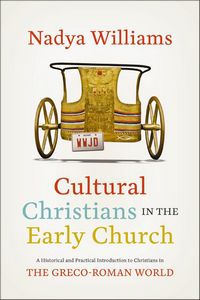 Cultural Christians in the Early Church: A Historical and Practical Introduction to Christians in the Greco-Roman World
Cultural Christians in the Early Church: A Historical and Practical Introduction to Christians in the Greco-Roman World
My original post
For Williams, Cultural Christians are “individuals who self-identify as Christians, but whose outward behavior, and, to the extent that we can tell, inward thoughts and motivations are largely influenced by the surrounding culture rather than by their Christian faith and teachings of Jesus.”
There are three driving concerns behind this book. The first is to combat the idea that the Early Church was too spiritual and correct to have to deal with these individuals—and because of that we can have some problematic ideas about the Church today. Secondly, because of our historical ignorance, we can fail to see how the Early Church was influenced by the culture around them. Third, if we see how the Early Church is susceptible to this, and that we are, too—we can more easily see the need to push beyond Cultural Christianity to the genuine article.
Williams does discuss some of the major theologians of the first few centuries of The Church (until around the time of Constantine), but her focus is on everyday believers. To get a real flavor of what life was like we don’t just need the theological tracts and creeds, we need to know what people ate, wore, did for a living, and so on.
We have the same feet of clay as our forefathers did—and the same challenges to overcome. Thankfully, we have the same Savior. This book helps us to remember that—and I encourage everyone to pick this up (and not just so you don’t have to hear me do it in person, as many of my friends have).
This could/should be read in conjunction with the books by Gupta and Presley on this list, they describe some of the same time period in overlapping but distinct ways.

A few books that almost made this list, and I want to be sure to mention one more time:
The Lord Jesus Christ: The Biblical Doctrine of the Person and Work of Christ by Brandon D. Crowe (My original post), The Two Kingdoms: A Guide for the Perplexed by W. Bradford Littlejohn (My original post), Saint Cyril of Alexandria and the Christological Controversy by John McGuckin (My original post), and The Hijacked Conscience: An Informed and Compassionate Response to Religious Scrupulosity by Debra Peck (My original post).
![]()




